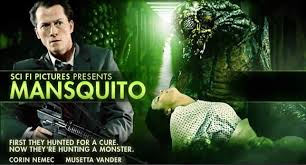Leaving the Science to the Voters

GMOs scare the hell out of people for some reason. I guess they’ve been watching too much science fiction, or something, because I really can’t explain the fear that a lot of people in a lot of places are exhibiting toward Genetically Modified Organisms. They think they’re mutants, or something.

I’m kind of okay with mutants, actually.
To get these rice plants, genes were spliced into their DNA. It could have been done with selective breeding — as we’ve done since we started growing our own food — but doing it this way is faster and more specific.
As with so much other technology, people are afraid of what they don’t understand. I don’t blame them. I get a little weirded out by things that I don’t understand, but I have been given the skills to try and learn and understand these things before I run away from them and proclaim them to be witchcraft or some such. Not everyone’s parents bought them a microscope and an encyclopedia before they started grade school.
The latest round of GMO-phobia comes from Florida, that bastion of rationality. The local health authorities, in an attempt to stop mosquitoes from transmitting disease without using insecticides, suggested the release of GMO mosquitoes. In other parts of the world, these GMOsquitoes have reduced the populations of mosquitoes by 80% or better. No mosquitoes, no Zika, dengue, chikungunya, yellow fever, etc.
“Oxitec’s plan is to inject mosquito eggs with DNA that contains lethal genes, then release the genetically modified males from that batch of eggs so they can mate with wild females. (Males don’t bite; so releasing only males is a way to make sure the release of these insects doesn’t contribute to the spread of disease.) The offspring of these lab-tweaked males and wild females, having inherited the altered DNA, cannot survive to adulthood. If all goes as planned, the mosquito population should shrink as a result. There’s already good evidence that shows Oxitec’s approach can work. Field tests in Piracicaba, Brazil, resulted in an 82 percent decline to the mosquito population over an eight-month period, Oxitec says.”
Good idea, right? Well, not if you ask some of the residents of the parts of the Florida Keys where the state health authorities want to try this. From NPR:
“But after five years, a small but vocal group of residents is not convinced the mosquitoes are safe. Opponent Dina Schoneck told the board, there are still too many unanswered questions about the new technology. She said, ‘I believe there are a lot of risks that are not being considered.'”
The board in question is the Florida Keys Mosquito Control District board, and they held hearings about a plan to release GMOsquitoes to prevent the coming wave of Zika and any other diseases that could also emerge (or reemerge) there. They even put it to a vote, and residents of the local district where the original plan was to go forward rejected the idea. Voters from the rest of the county approved. So now the board is looking for other sites to try out the plan before a wider implementation.
That whole thing of “unanswered questions” reeks of ignorance and fear of science to me. What do they think will happen if they get bit by a GMOsquito? (Females Males are the only ones that bite, by the way.) This?

I mean, I understand the fear of GMO food because we eat it. GMO viruses? Those bastards infect OUR genetic code themselves. Vaccines? We inject them. Radio waves? They go through us. But to be afraid of mosquitoes just because?
Of course, as anyone in public health who is worth their weight will tell you, it is our job to allay the fears of the public regarding all things that affect their health. It does us all a disservice to say, “Take this goddamned vaccine because I said so.” Instead, we need to explain vaccine science to the best of our ability and to the widest audience possible. Same with GMOs in general and GMOsquitoes in particular.
Does it anger me when people continue to be anti-science even after it’s been explained to them? Yep, but only if those people should know better. Because there are tons of people who should know better on all sorts of subjects and they continue to propagate fear and misunderstanding of those subjects. Just look at our current President-elect. The dude has been on this Earth for 70 years, and he still thinks that climate change is not a thing, or that a wall will keep out the scary Mexicans… Or that vaccines cause autism.
How do you allay the fears of the irrational, or the irrational fears?
The worst thing about leaving the science — and the public health response — to the voters is that it leads to poor or uninformed decisions. But we have to do it this way in the United States because we’re a democracy, and we can only hope that the voters are as best informed as possible. Then there is also the concept of informed consent, autonomy, and justice when it comes to what we do. The people we’re serving need to know what is going into whatever intervention we’re doing, they need to be regarded as thinking adults, and the risks and benefits must be spread out to all.
Sucks to be ethical, right? (<— Just kidding about this.)
Look, there are going to be a lot of things coming out from science in our lifetimes. Most of it will be good. Some of it, I’m sure, will be hijacked to be used for evil. All in all, the benefits of science outweigh the risks, and we need to be cognizant that there are going to be people who will not see it this way. The most successful people in epidemiology (my kind of epidemiology, anyway), the legends, they were the ones who convinced people to join them in the sun… Or remove a pump handle.
“(Males are the only ones that bite, by the way.)”
Did you mean “females” instead of “males” here?
LikeLike
I did. Thanks!
LikeLike